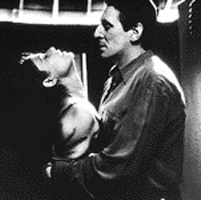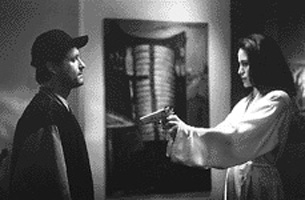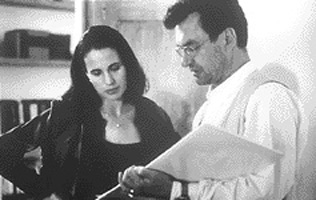 The Ending of the End
The Ending of the End
Part One: An Introduction
Talking To Wim Wenders
by Adam Haynes
Everett Stillwell finishes vomiting into the toilet. Leaning back up, he wipes the residual chowder/bile off his face with the sleeve of his gabardine suit and smiles. “I wanted you to see that, kid,” he says.
Wim Wenders is morose to the point of being polite. His spirit animal is a mole, and as he discusses his new film, The End Of Violence (MGM), he sounds like a mole, a sad quiet creature resigned to his artistic urges and the ineffectiveness of antidepressants. “…all through the history of movies, film had an ambiguous relation to violence. Violence is certainly extremely attractive. I can’t say it appeals to me, on the other hand it does. I mean, I think violence is an important subject in movies and I would fight for that. My problem with violence is that it has degenerated from being that important subject to disappearing in the [film] language, to entering each and every film as if it were some ingredient and I think that is troublesome. Today, everything is violent. It doesn’t need it. Everything is always shown explicitly. The greatest thing movies can do is not show something and make it even scarier.”
We’re sitting on the floor of one of the stalls in the men’s room at a bar in Cambridge. “Are you there yet?” Stillwell keeps asking me, “Are you there yet?” I’ve been slamming vodka sours for the last two hours, which to me means I must be…somewhere, so I nod my head and watch the stall walls ripple slightly around me. Stillwell takes a pint of Five O’Clock gin from inside his suit. Has a long suck, shaking his head. Offers me the bottle and I can’t really say no because I’ve come this far. Smells like paint and pine trees and faintly of Stillwell’s own puke. Is that what he wants? Is this all about regurgitation?
 Talking to Wim Wenders in a executive conference room of the Four Seasons on a balmy grey morning in the early stages of Fall, I can’t help but feel like I’m in a Wim Wenders movie – though I am well aware this is just my own psychotic projection propensity. Most people say 1988’s Wings Of Desire is their favorite Wenders film, and even though I’m a sucker for angels and trapeze artists and Rilke, I’d have to go with Paris, Texas, which he made in 1984 from a script collaboration with Sam Shepard. Out of all the films of his lengthy career (he’s been making narrative, avant garde, and documentaries with extreme regularity in his native Germany and abroad since the early seventies)Paris, Texas, for me, has got to be his most beautiful film. It encapsulates perfectly all the important Wenders themes: transience, loneliness, our inability to ever satisfyingly connect with other human beings. Aesthetically, much of this can be traced to the early Japanese cinema of Ozu – who Wenders adores – and the wider Japanese artistic theme of mono no aware, or, roughly translated,peaceful sadness over the ephemeral nature of existence. “Worldwide homesickness” was how one critic described his cinema, and it’s sweet in a way that Wings Of Desire should be so popular because it was his first story to have a happy ending, which hinted that finally Wenders himself had finally found a sense of home, found a way to root himself in the world around him. The End of Violence indicates that life is just as complicated in a rooted setting as it is in an ambient one. Even if you move beyond alienation you can’t ever get away from the difficulties of communicating in a modern world. As more recent projects, like Until The End of the World, have shown, Wenders is shifting his alienation away from other people to their technology. “We’re all proud that we have these new tools but in the end they’ve made us all a little more lonely. I mean, I just came back from the Venice Film Festival and I couldn’t believe my eyes. I was sitting at a table with four or five people and everybody was talking on their telephones at the same time. Nobody talked to anybody else. They were all on their phones. Our culture is going in the direction that we need more and more secondary experiences anyway. Not necessarily voyeuristic, but leaning to second-hand more than first-hand.”
Talking to Wim Wenders in a executive conference room of the Four Seasons on a balmy grey morning in the early stages of Fall, I can’t help but feel like I’m in a Wim Wenders movie – though I am well aware this is just my own psychotic projection propensity. Most people say 1988’s Wings Of Desire is their favorite Wenders film, and even though I’m a sucker for angels and trapeze artists and Rilke, I’d have to go with Paris, Texas, which he made in 1984 from a script collaboration with Sam Shepard. Out of all the films of his lengthy career (he’s been making narrative, avant garde, and documentaries with extreme regularity in his native Germany and abroad since the early seventies)Paris, Texas, for me, has got to be his most beautiful film. It encapsulates perfectly all the important Wenders themes: transience, loneliness, our inability to ever satisfyingly connect with other human beings. Aesthetically, much of this can be traced to the early Japanese cinema of Ozu – who Wenders adores – and the wider Japanese artistic theme of mono no aware, or, roughly translated,peaceful sadness over the ephemeral nature of existence. “Worldwide homesickness” was how one critic described his cinema, and it’s sweet in a way that Wings Of Desire should be so popular because it was his first story to have a happy ending, which hinted that finally Wenders himself had finally found a sense of home, found a way to root himself in the world around him. The End of Violence indicates that life is just as complicated in a rooted setting as it is in an ambient one. Even if you move beyond alienation you can’t ever get away from the difficulties of communicating in a modern world. As more recent projects, like Until The End of the World, have shown, Wenders is shifting his alienation away from other people to their technology. “We’re all proud that we have these new tools but in the end they’ve made us all a little more lonely. I mean, I just came back from the Venice Film Festival and I couldn’t believe my eyes. I was sitting at a table with four or five people and everybody was talking on their telephones at the same time. Nobody talked to anybody else. They were all on their phones. Our culture is going in the direction that we need more and more secondary experiences anyway. Not necessarily voyeuristic, but leaning to second-hand more than first-hand.”
Stillwell spits into the toilet and licks his lips, “Hip is dead,” he says. “Hip is dead, kid. You heard it from me first.”
“You mean in cinema, or in life?”
“What difference is there?” He screams, suddenly agitated. “Our world is burning. Hip is dead – it is the path out of the fire.”
“Please, I’m confused.”
 Stillwell groans. “How do I explain the nose on my face?” He murmurs. “Look around you, look at what’s going on. We are living in an era of irony and cynicism. I’m talking about narrative here – you dig that? I’m talking about stories which are made and the reviewers who judge them. I’m talking about hipness. I’m talking about shallow for the sake of shallow, I’m talking about reviewing a movie by cutting it down for not fitting some idealized version that floats up in the heavens – which doesn’t exist. What exists is what you see on that screen, and that’s all there is. I’m talking about burning it all down because that’s the direction it’s all going anyway. I’m talking about the end – ”
Stillwell groans. “How do I explain the nose on my face?” He murmurs. “Look around you, look at what’s going on. We are living in an era of irony and cynicism. I’m talking about narrative here – you dig that? I’m talking about stories which are made and the reviewers who judge them. I’m talking about hipness. I’m talking about shallow for the sake of shallow, I’m talking about reviewing a movie by cutting it down for not fitting some idealized version that floats up in the heavens – which doesn’t exist. What exists is what you see on that screen, and that’s all there is. I’m talking about burning it all down because that’s the direction it’s all going anyway. I’m talking about the end – ”
“You’re talking about The End of Violence…”
He smiles and nods his head, “Now you’re seeing your nose, kid, now you’re seeing it. Stories over statement. Freedom.”
The End Of Violence isn’t really about the end of violence, it’s more like a meditation of our perceptions of violence and its inevitable presence within human interaction. One part William Gibson techno thriller, one part detective story, one part Hollywood romance – essentially all film genres except horror (and this is because Wenders hates horror films. The last one he tried to watch was Alien and he had to leave), the film remains unmolested by both cliché and stereotypes. How was he able to pull all this off? Lack of irony. The current state of movie culture has sunk to a level where it’s more important to be clever and reactive – both in films and in the reviews of them (when a film critic begins and ends a column with a pun lifted from the title of the film being reviewed – isn’t this just unnecessary ego bullshit? Does this really have anything to do with movies?). Wenders offers a hopeful direction for the future. Well-told stories based on artistic uniqueness. The End Of Violence does not succeed because it follows a formula well, or reacts against a formula well (the biggest copout), but because it is a story which incorporates all the language and grammar of cinema then uses them as more than just as an end in themselves… Wenders again is showing us a new beginning.



